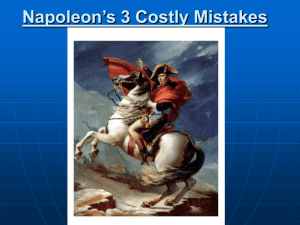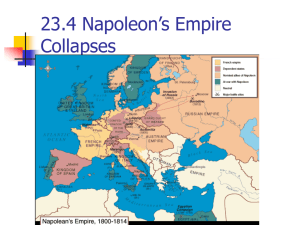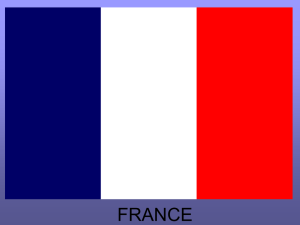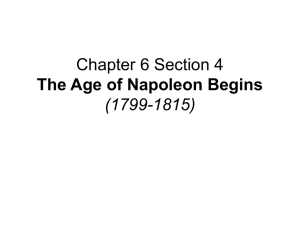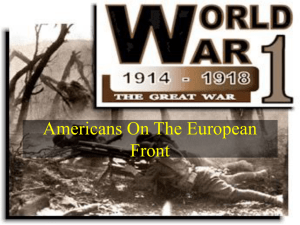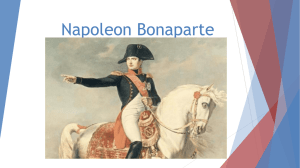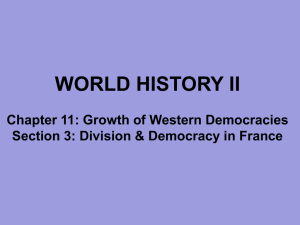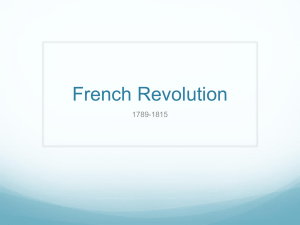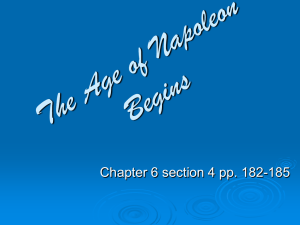World History State Standards 1-5
advertisement
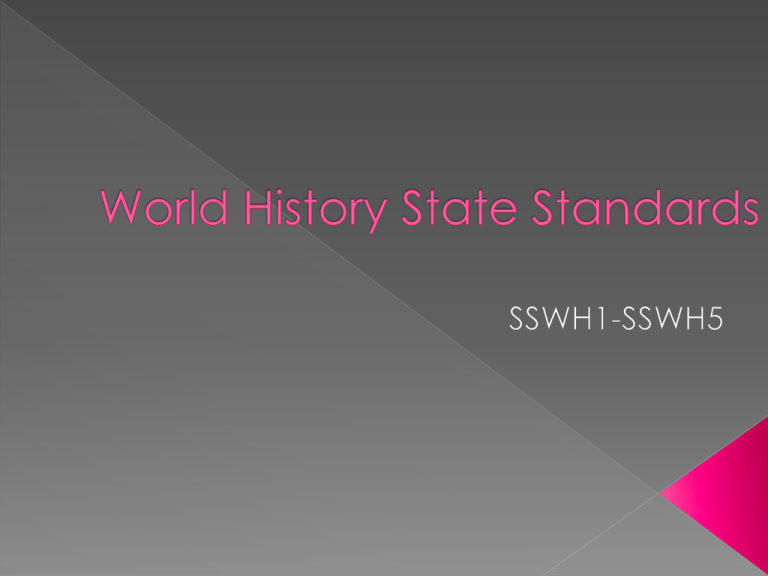
Describe the policies of the Tokugawa and Qing rulers, to include Nobunaga and Kangxi. Tokugawa: • Daimyo, heads of noble families controlled lands and warred with their neighbors. • Set out to establish control of the feudal system. • The samurai who had served the daimyo ceased to be a warrior class. Kangxi: • Could speak, read, and write Chinese • Firmly believed the Manchus had a legitimate claim to the Mandate of Heaven • Toured areas where Ming support had been the highest; gave an exam to compile the official history of the Ming Dynasty Qing: • Tried to maintain their cultural distinctness. • Brought Chinese into the imperial administration. • Ordered all men to adopt • Manchu dress & hairstyles. • Restored peace & prosperity. • Under Kangxi, the efforts of Christian missionaries reached its height. Odo Nubunaga: • Major daimyo during Japanese history. • Dominance and brilliance was not restricted only to the battlefield for he also was a keen businessman and understood the principles of microeconomics and macroeconomics. • Militarily, Nobunaga's revolutionary dreaming not only changed the way war was fought in Japan, but also in turn made one of the most modernized forces in the world at that time. Analyze the Impact of population growth and it’s impact on the social structure. Moghal Empire Describe the geological extent of the Ottoman Empire during the rule of Suleyman the Magnificent, the Savafid Empire during Ottoman Empire reign of Shah Abbas I, and the Moghal Empire during reigns of Babur & Akbar. Savafid Empire Explain the ways in which these Muslim empires influenced religion, law and the arts in their parts of the world. The Muslims' art included: ceramics, glass, metalwork, textiles, illuminated manuscripts, and woodwork flourished. Religion spread through trade, the Muslims we’re very extreme with it that they passed it on. Some Emperor’s were easier going than others, at a time women had many rights. This helped other parts of the world become more aware of the women's roles. Explain the scientific contributions of Copernicus, Galileo, Kepler and Newton and how ideas changed European view. Copernicus Earths daily motion on it’s axis Galileo Galileo has been called the "father of modern observational astronomy," the "father of modern physics," the "father of science," and "the Father of Modern Science Kepler He is best known for his eponymous laws of planetary motion Newton Universal gravitation and 2 laws of motion. Identify the major ideas of the enlightenment from the writings of Locke, Voltaire and Rousseau. & relations to politics and society. Locke believed in the social contract & identity and self finding. He influenced Voltaire and Rousseau. Rousseau’s thinking and philosophy influenced French revolution. Voltaire was a writer known for his wit and his advocacy for civil liberties. Many countries are still with these philosophers ideas. Examine absolutism through a comparison of the rules of Louis XIV , Tsar Peter the Great, Tokuwaga Leyasu Louix XIV Tsar Peter the great Tokuwaga Leyasu Louix continued his former prime Minster's Peter was influenced by his advisors from western Europe. He made nobles cut off robes to knee length and also made men cut off their beards, and taxed who ever didn't obey. He aimed at modernizing Russia. He encouraged Russian men to marry European girls. As most of rulers, he wanted to open a "Window to the West". If this happened, Russia could trade year round. Many wars were fought over it. Tokugawa seized power in 1600. He was one of the three unifiers of premodern Japan. He allied himself initially with Nobunaga; that alliance allowed Ieyasu to survive the turnover of endemic warfare in Japan at that time and to slowly build up his territory. By the 1580s he had become an important daimyo in control of a fertile and populous domain. work of creating a centralized state governed from the capital. He looked to eliminate the remains of feudalism carrying through in parts of France and by forcing the noble elite to live in his lavish Palace of Versailles for much of Louis' reign France stood as leading power. Identify the causes and results of the revolutions in England , US, France, Haiti, and Latin America England United States Latin America France Haiti James wanted England to be catholic again. Parliament opposed and made up a rumor which caused him to flee to his cousin Louis. The 13 colonies got together to break away from the British Empire Self Sufficiency of countries Was bankrupt and in debt. The queen was spending the peoples money on needless things. Mulattoes wanted to be equal to whites and slaves wanted freedom. Replace ment of James. War with France. Joins great alliance Revolution Latin won revolutio independ n, Africa ence Fall of Bastille, French revolution. Change of governme nt. Haitian victory, influence d revolt of other British colonies. was increase d in interest. Explain Napoleon’s rise to power, defeat and consequences for Europe Napoleon had a phenomenal ability to memorize facts. That came as an advantage because it made his troops want to fight and gave them motivation. Napoleon was successful militarily because he took ideas of others and adapted them. He used two techniques: Rapid movement of troops and Massing troops at critical points on the battle field. He also used propaganda. Napoleon severed in the army during French Revolution. He was becoming too powerful and that worried the Directory. His plan was to take over Europe. He took over most of central Europe -formed the Confederation of the Rhine to help him govern all those nations. He changed the map of Europe. As a result after his defeat, there were revolutions all over Europe because nations didn't like the boundaries drown by the Vienna of Congress. In 1804, Napoleon made France an Empire and crowned himself Emperor. He also issued the Berlin-Milan Decree that blockaded Britain and Europe- called the Continental System. No country on the continent of Europe could trade with Britain or it's allies without Napoleons permission. Russia refused to obey it. Spain revolted against him while Britain was fighting him and Napoleon decided to invade Russia. He sold the Louisiana Purchase to finance the invasion of Russia. French troops were not used to being in cold weather like Russians in the winter. This was the beginning of the end for Napoleon. He was unprepared for the unexpected. Four nations of Europe were formed to stop Napoleon, it was called the Quadruple Alliance. They got together to stop him at the city if Leipzig in Belgium and forced him to abdicate. During that battle the Duke of Wellington defeated him. His reasons for downfall were: Failure to dominate seas was his biggest problem, defeat of russia was the beginning of the end for him, and he did not stick to his own tactics during the battle with Wellington and he used it against him. Examine the interaction with westerners to include Opium war, the Taiping rebellion, and Commodore Perry. Identify the causes of the war including Balkan nationalism, entangling alliances, and militarism. The rise of nationalism caused competition between nations, with each seeking power. Austria-Hungary and Russia failed to overpower the Balkans. The alliance was made to keep peace in Europe, but it did the exact opposite. Alliances were being formed. Italy, Germany, and Austria-Hungary formed the triple alliance. Europe's nations thought that they needed to have a powerful military prepared to move quickly in case of a war. This caused countries to have detailed plans for the mobilization if troops. Describe the conditions on the war front for soldiers including the Battle of Verdun. Conditions of war fronts for soldiers were miserable. In trench warfare, soldiers fought each other from trenches. Gaining land between trenches caused many of the soldiers' lives. Many soldiers died in gaining very small amounts of land. The mud in the fields was formed from the blood of soldiers. The trenches were unsanitary and there was no fresh food for people. When troops went over the top of the trenches into "no man's land," there was nearly no chance of survival. In the Battle of Verdun, over 20,000 British soldiers were killed in the first day of battle. Explain the major decisions made in the Versailles Treaty including German reparations and the mandate system that replaced Ottoman control. Major decisions in the Treaty of Versailles were making the league of nations, taking over land, limiting militaries, and war guilt. Germany was held responsible for the war. Germany had to pay the allies $33 billion in reparations over 30 years. Germany's military was limited to a certain size. Allies took up all the Ottomans' land and made mandates. Britain controlled Palestine, Iraq, and Transjordan. France controlled Syria and Lebanon. Analyze the destabilization of Europe in the collapse of the great empires including the Romanov and Hapsburg dynasties. At the end of WW1, the Ottoman and Austrian empires were lost. This caused the collapse of the Romanov and Hapsburg dynasties. After the war, Austria-Hungary was split up into several separate nations. The Romanovs powers were weakened and finally couldnt withstand the aftermath of WW1 and the communist revolution. The last Romanov czar gave up his power and the dynasty lo longer existed. http://www.biographybase.com/ biography/Oda_Nobunaga.html http://www.jstor.org/pss/3203065 http://en.wikipedia.org/wiki/Islami c_Golden_Age#Polymaths http://www-groups.dcs.stand.ac.uk/~history/Mathematicia ns/Copernicus.html
